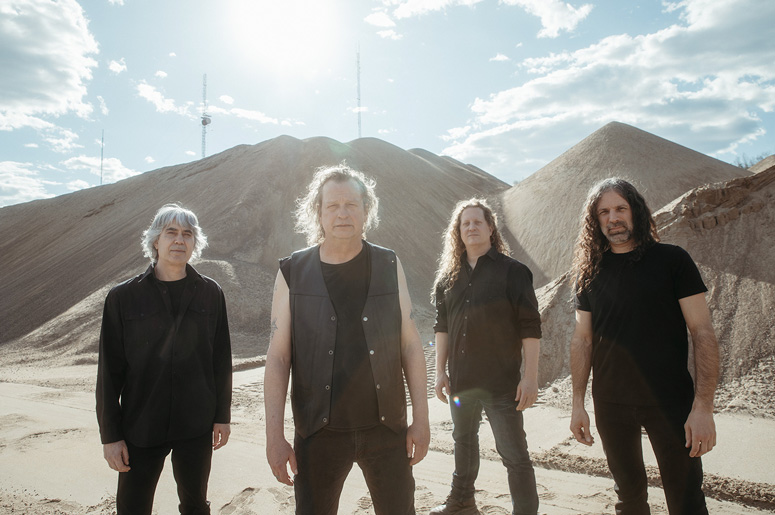Voïvod symphonique: a mammoth metal career as seen through seven songs, with Michel Langevin
Legendary Quebec metal band Voïvod is revered around the world by fans of the genre and by music lovers who appreciate the virtuosity of its screaming guitars. The group’s repertoire, which often borrows codes from classical music, easily lends itself to symphonic reinterpretations. Conductor Dina Gilbert is embarking on the adventure with the OSM and the current members of Voïvod (Michel Langevin, Denis Bélanger, Daniel Mongrain, and Dominic Laroche), who will join the orchestra’s musicians on stage in January 2025.
It's going to hit like a ton of bricks, and fans are anxious to hear the augmented versions of their songs, as adapted by Hugo Bégin.
We’re taking this opportunity to speak to Michel Langevin about some iconic titles from the band’s unique universe.
Astronomy Domine: Science fiction plays a significant role in Voïvod’s world. What is your vision of space and how does it influence your music?
Michel Langevin: Since childhood, I’ve been fascinated with science fiction. Authors like Philip K. Dick and works like Métal hurlant have had a profound influence on our aesthetics. Space, for me—beyond what astronomy as such encompasses—, is above all the permission to look even further, to allow oneself to open up to all sorts of parallel worlds, an infinite territory to explore, and it nourishes our sound and visual universe.
Into My Hypercube: Why tell the story of an apocalyptic future? Is it a way to protect ourselves from it?
M.L.: Our visions of dystopia go back a long way. Métal hurlant, once again, and works like Planet of the Apes were an influence. We’ve always been interested in dark scenarios. Imagining a disturbing future is a way of protesting against military technology and environmental threats—and a way of exorcising these fears. Our discourse is never just denunciation, but contemplating the possibility of these futuristic worlds invites our young fans to reflect on these issues.
Killing Technology: Since your beginnings in the 1980s, your work has touched on technological advances. In your opinion, should we be wary of artificial intelligence today?
M.L.: We’ve got to keep an open mind, that’s for sure. But we do have to deal with AI. For a few years now, we’ve been using it for some of Voïvod’s videos, and it also helps me with my drawings, but we need to be careful. There are ethical issues, especially when AI uses the works of other artists. Personally, I consider it a tool, but never a substitute for our own human creativity.
Ripping Headaches: What were the most difficult moments in your career, when you really felt like you were battling ripping headaches?
M.L.: There were times that were especially trying, like the accident in Europe, when our van rolled over five times and our singer at the time, Eric Forrest, was seriously injured. We almost gave up everything after that. There was also the death of our guitarist, Denis “Piggy” D’Amour, in 2005, a period of great uncertainty when we didn’t know if we wanted to continue. It was a great loss. Denis was an extraordinary, exceptional, very inventive guitarist.
The Prow: If you had to compare your musical path to a crossing, when would you say you most benefited from favorable winds?
M.L.: The year 1990, with the Nothingface album, was incredible. We were being seen on MTV, and that gave us the opportunity to go on tour with bands like Rush, Soundgarden, and Faith No More. Another highlight was when Jason Newsted [ex-Metallica] came along in the early 2000s, giving us the chance to open for Ozzy Osbourne. That was incredible.
Clouds in My House: How do you deal with those moments when clouds upset your artistic vision?
M.L.: For me, drums have always been an outlet. Playing allows me to relieve stress and anxiety. At the same time, I also draw, which helps me maintain a balance. It seems contradictory but drawing dark and dystopian worlds soothes me. Simply put, for Voïvod, art is absolutely therapeutic. To ease the anxieties caused by the world we live in, we make music! And it works!
Panorama: How would you describe the panorama of the metal scene today compared to your beginnings?
M.L.: Everything has changed! Back then, to get your name out there, you had to go through fanzines—little photocopied magazines that people sent to each other by mail. Today, everything is instantaneous, but it also makes things more complicated for new bands. The competition is tough. That said, the metal scene is still solid, and that’s encouraging.
Beyond the sharp riffs and devastating rhythms, Voïvod embodies a world where art and technology intersect, where personal and collective struggles become hymns. It’s a sure bet that with the symphonic versions of their songs, Voïvod will invite us to further reconsider our future, to call systems into question, and to explore new dimensions.



